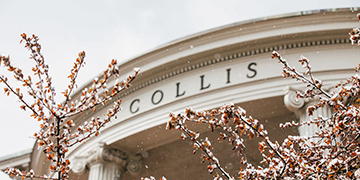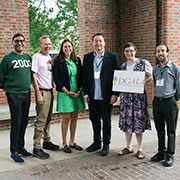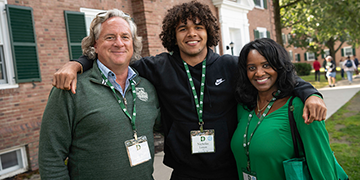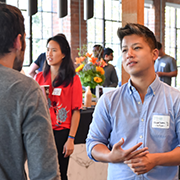The Voice of the People
Gauging Sentiment, Checking Pulses, and Connecting Alumni to Campus
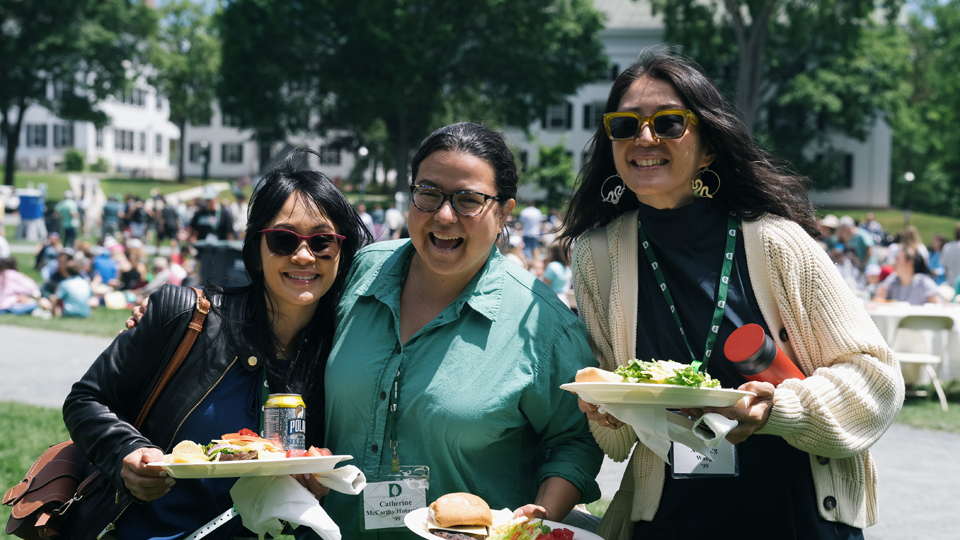
3 minute read
Celeste Gigliotti
3 minute read
The granite of New Hampshire is made part of them ‘til death. They’re strong words, those alma mater lyrics, and yet perfectly apt for so many in the alumni community. Connection to campus, to the Dartmouth experience, is not diminished by distance or phase of life—Dartmouth alumni care about what happens back in Hanover.
But how can alumni possibly affect change at dear old Dartmouth from afar? That’s where the Alumni Liaison Committee, or ALC, comes in.
An advisory committee within the Alumni Council, the ALC helps foster a lifelong connection with alumni by supporting the Alumni Council’s mission—to “sustain a fully informed, representative, and engaged exchange of information and sentiment between alumni and their College.”
It’s an important task for everyone involved—and that’s how Chitra Narasimhan, chair of the Alumni Liaison Committee, sees it, too.
“Alumni might not think to reach out or know where to go when they have something they want to share. Whether it’s big or small, the ALC wants to make sure that it gets seen,” she said. “It’s an outlet on the alumni side, and it’s an important trend analysis on the College and board leadership side.”
But how best to gauge alumni sentiment? How to help alumni feel heard and help administration make decisions with this key population in mind? At this intersection of interests, the ALC Pulse Check was born.
Conducted first in March 2021 and every six months from then on, the pulse polls serve as a forum for alumni volunteers to speak their minds, on behalf of themselves and their constituents, in a consistent, organized structure.
The Pulse Check is composed of a series of multiple choice and open-ended questions that seek to understand what issues are particularly important to alumni, so Dartmouth leadership has an evolving sense of how their alumni body is feeling. The beauty of the Pulse Check lies in its ability to be mapped over time to understand how well Dartmouth is addressing alumni concerns. It aims to be a longitudinal gauge of sentiment, comparing each six-month span to the last.
While the major themes tend not to change, Narasimhan explained, the concentration of what’s important might. It is the ALC’s job to understand what is important to alumni now, and, in certain circumstances, to give input about what administration should do about it. These often come in what are called Snapshot Reports, or reports on notable topics if the ALC recognizes a particular trend in the data. A recent Snapshot covered alumni concerns around mental health on campus. All these reports make their way to the full Alumni Council, College leadership and eventually the Board of Trustees.
“In those Snapshot Reports, we do try to add recommendations in there, to take on an advisory capacity. That’s where the ALC can be even more helpful,” Narasimhan said.
With Pulse Checks and Snapshot Reports on notable topics, the ALC and by extension, alumni, can have a very real impact on the happenings on campus. Alumni volunteers have given feedback about presidential priorities, housing issues, mental health initiatives, and more. And impact can be made once those issues, whether macro or micro, have been identified.
That impact is reliant, though, on this delicate feedback system and the good faith of the players within it. For example, alumni must feel safe and compelled to relay their true feelings to their councilor representative, and councilors must feel comfortable to do the same in the Pulse Check.
Narasimhan has been impressed with the diligence and thoroughness of the representatives, and credits much of the efficacy of the system to that.
“What I find is, because we’re going to people who are alumni councilors, class presidents. and leaders of affinity groups for example, they represent constituencies. So, it’s not really one person’s view—it’s one person’s reflection of their constituency, she said. “To give you an example, we just had someone who was going to fill out his survey after his 50th Reunion. He was going to talk to attendees at his Reunion and then fill out his survey. It is, in some ways, a good composite of feedback.”
In this way, the ALC seeks to amplify every alum’s voice, and takes seriously their responsibility to liaise between the alumni population and the campus they called home.
“Alumni need to know their taking the time to write that feedback is valued and went somewhere.” Narasimhan said. “And I think that’s really important.”


